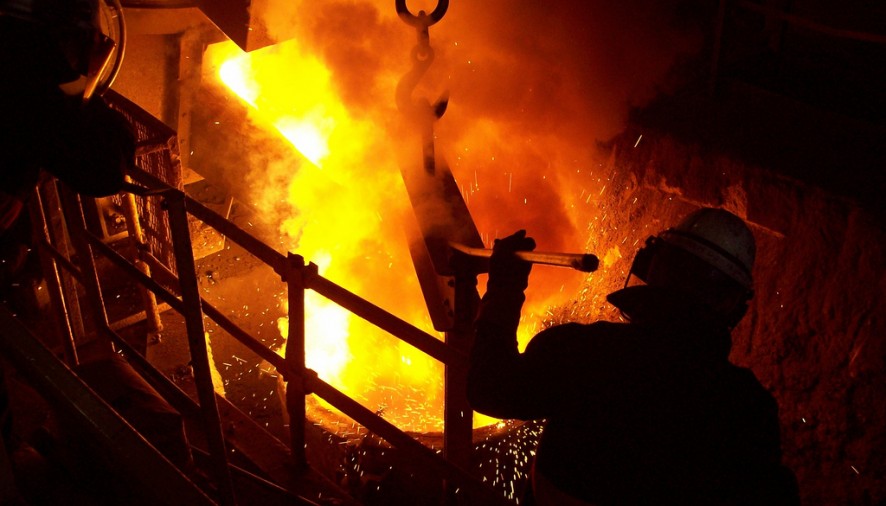Something is up with the steel industry, something much more complex than productivity or profit. What was once a flagship for industrial might, today, the current slump suffered by British steel jeopardises thousands of jobs, the livelihood of communities and ultimately the country’s position in the market. As cheap Chinese-produced steel continues to flood the market, the decline looks set to linger.
Sheffield, Scunthorpe, Redcar. Go back one-hundred years and these places were the heart of Britain’s steel industry; however, that heart – once beating strongly – is on the brink of its last contraction. The 250,000 steel workers employed in 1967 have now fallen to a meagre 25,000, with those remaining sincerely hoping that this will be the end of redundancies.
Why is steel so important? It is effectively an alloy of iron containing up to 2.1% carbon and a plethora of other elements such as manganese, nickel and chromium (the latter, a key constituent of stainless steel). With a high tensile strength and excellent resistance to corrosion, steel is a champion of human ingenuity, forming the major component in machines, buildings and automobiles. Indeed, in 2015 around 1.2 billion tonnes of steel was produced globally, enough to build the Empire State Building more than 21,000 times. Steel is clearly a big deal.
Undoubtedly, there is a necessity for steel, however a quick scan of the country-specific production figures indicates where a major problem lies; China produces half of it.
The huge supply of Chinese steel has saturated the market, influencing global values and driven down the price; imported Chinese rebar – reinforced steel in rod form – is currently £309/tonne, significantly lower than the global average price. This, coupled with the UK’s high-energy costs, green taxes and strong currency, means there are no surprise in British steels’ struggle to compete. The growing demand for Chinese steel imports, up by 125% between January and June this year (compared to 2012 figures), has seen the UK’s industry buckle, sending shockwaves through steel-dependent communities.
As a result, last month the SSI owned steelworks in Redcar announced its closure, bringing 2,200 jobs and 170 years of steelmaking to an end. Additionally, Caparo Industries – reliant upon steel products – plunged 16 of its 20 businesses into administration placing 1,700 jobs on the line. Indeed, October proved to be a dark month for the UK steel industry, with nearly 4,000 jobs either lost or placed in peril.
These recent woes are indicative of longer-term issues, as Tata Steel, owned by Indian giant Tata, have reduced their UK business value three times since buying Corus (which included the remnants of British Steel) for £4.3bn in 2007. Tata Steel now looks set to add to the redundancy count by mothballing one of two coke ovens in Scunthorpe, resulting in 900 job cuts. Following the continued flow of bad news from the steel sector, HM Government has pledged to contribute towards a figure of £9m, to support steelworkers and local businesses in Scunthorpe, however this sum has been branded “woefully inadequate” by trade unions.
Amidst the chaos, calls for the Government’s intervention – further to financially supporting affected communities – have increased. The business secretary, Safid Javid, has announced the formation of working groups, chaired by ministers, to examine how public procurement and the associated energy and environmental costs can improve the competitiveness of the sector. Furthermore, EU leaders have vowed “a full and speedy response” to the imports diluting the steel market. However, the meetings have so far done little to calm the nerves of unions, frustrated at the lack of urgency shown.
Aside from the devastation to local communities that mass redundancies will cause, negatively impacting local suppliers, businesses and economies, the supply chain of steel will be badly hit too. UK Steel has warned that their Dalzell plant, soon to be mothballed, is the only facility in the UK capable of producing the “exotic specifications” demanded by the offshore oil and gas industry for drilling pipelines and platforms, while Scunthorpe-produced steel is some of the best in the world for use on railways. It appears that the repercussions of a failing steel industry are set to be felt far and wide, with many companies already on a slippery slope. If British steel was once the heartbeat of UK industry, then this current crisis is a countrywide cardiac arrest requiring immediate treatment.
Sandy Kelly
[Image: Goodwin Steel Castings, hosted on Flickr]

